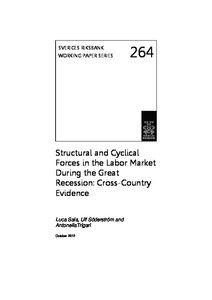Structural and cyclical forces in the labor market during the great recession: cross-country evidence

Sala, Luca ; Söderström, Ulf ; Trigari, Antonella
Sveriges Risksbank - Stockholm
2012
62 p.
comparison ; economic recession ; labour market ; unemployment
Germany ; Sweden ; United Kingdom ; USA
Working Paper Series
264
Business economics
English
Bibliogr.
"We use an estimated monetary business cycle model with search and matching frictions in the labor market and nominal price and wage rigidities to study four countries (the U.S., the U.K., Sweden, and Germany) during the financial crisis and the Great Recession. We estimate the model over the period prior to the financial crisis and use the model to interpret movements in GDP, unemployment, vacancies, and wages in the period from 2007 until 2011. We show that contractionary financial factors and reduced efficiency in labor market matching were largely responsible for the experience in the U.S. Financial factors were also important in the U.K., but less so in Sweden and Germany. Reduced matching efficiency was considerably less important in the U.K. and Sweden than in the U.S., but matching efficiency improved in Germany, helping to keep unemployment low. A counterfactual experiment suggests that unemployment in Germany would have been substantially higher if the German labor market had been more similar to that in the U.S."
Digital
The ETUI is co-funded by the European Union. Views and opinions expressed are however those of the author(s) only and do not necessarily reflect those of the European Union or the ETUI.